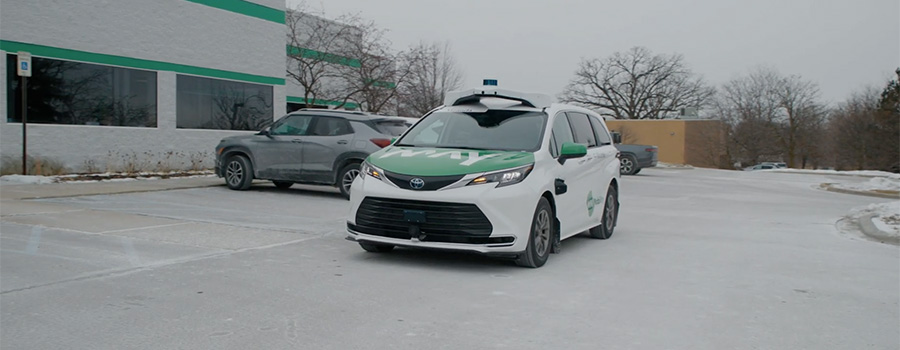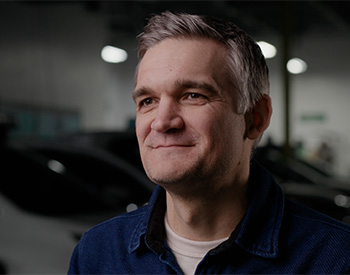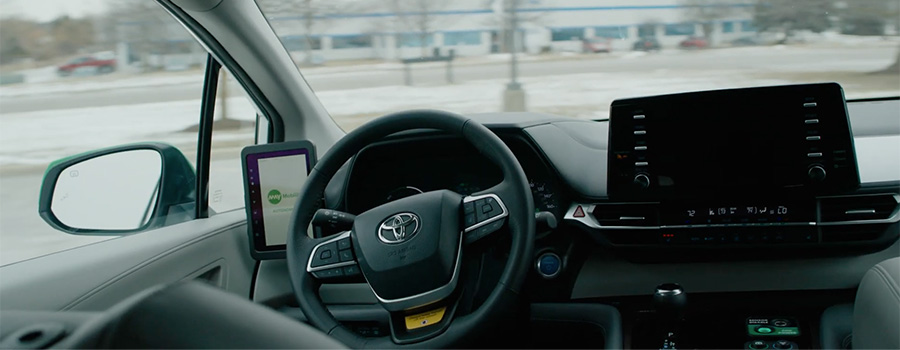It's a blustery morning in Detroit, and Nancy Kelly has a full day ahead of her. She's a transplant from Austin, having moved recently to be closer to her family. Due to her visual disability, she had to stop driving altogether—but that hasn't slowed her down. Kelly uses an innovative transportation solution powered by May Mobility to maintain her independence. When it's time to go, she simply opens an app on her phone and books a free ride to her destination. Within moments, an autonomous vehicle pulls up and Kelly gets in. Then she's on her way, traveling to her destination independently, without needing to ask for assistance or schedule traditional accessible transportation service in advance.

May Mobility brings independence to seniors and people with disabilities
Americans have long associated private cars with romantic ideals of freedom and independence. But for those who can't drive—such as many seniors and people with disabilities—this reliance on personal vehicles has created significant barriers to mobility and navigating life with ease.
May Mobility sought to address this challenge with the launch of a revolutionary autonomous vehicle service in partnership with the City of Detroit—part of a new program called Accessibili-D. For Kelly and many people like her, existing transportation options often made it difficult to live an active life. Simple errands like grocery shopping or medical appointments were unnecessarily complicated, to say nothing of the social and recreational outings that are also essential to the well-being of seniors and people with disabilities.
Though she didn't know it at the time, Kelly was the program's very first rider. The on-demand autonomous transportation service quickly restored her freedom to move about the city.
"The idea of having flexibility as a senior when you don't drive is really important," she said. "You can decide you want to go somewhere and dial it up on your app. It offers so many options."
May Mobility believes that these autonomous vehicle rides can significantly improve the independence and quality of life for seniors and individuals with disabilities, with safety as the top priority.
May Mobility's ambition is to reimagine transportation to be safer, more convenient and ultimately make our cities more livable and more accessible for everyone, said Frank Renwick, Vice President of Marketing at May Mobility. He noted that every year in the United States, about 40,000 people die in automobile accidents.
"Autonomous vehicle technology has the capability to drastically reduce that number," Renwick added. "We're highly invested in bringing this technology and our platform to as many communities around the country as we can to help accelerate that transition to a safer form of vehicle transportation."
For John Wyman, Director of Software Engineering at May Mobility, the mission is personal. Like Kelly, his mother can no longer drive. "I give her a lot of help with getting to things that she needs to get to," Wyman said. "She knows how powerful this [solution] will be for people who are in a situation like hers. I think that people are curious, and they can see the social change that can come with it."
Autonomous vehicles require reliable connectivity for safe navigation
With this in mind, May Mobility designed its autonomous vehicle fleets with passenger safety as a top priority. The approach involves multiple layers of protection through sophisticated sensors, constant monitoring and immediate access to remote assistance. For example, the moment a vehicle recognizes that it has encountered a complex situation, it seeks guidance from a qualified human. "When the vehicle encounters something it doesn't feel great about, it's going to do the safe thing," Wyman explained. "It's going to stop and let the remote operator come in."
Safely operating autonomous vehicles in varying and rapidly changing conditions presents significant technical challenges, from navigating complex traffic situations to maintaining reliable performance in extreme weather. May Mobility needed its vehicles to operate effectively in any condition—Michigan snowstorms, Arizona heat waves and everything in between.
"Our vehicles have the capability to function on a day when it's ten degrees in Ann Arbor, Michigan, or operate in 105 degrees in Sun City, Arizona," Renwick said. "That's one of the goals of our company—to operate in these very diverse weather environments where people need to travel. Weather can't be a limiting factor for them."
Crucially, these vehicles require constant connectivity to enable near real-time monitoring and rapid response to changing road conditions. Although many consumer and even business applications work perfectly fine with rapid download speeds, autonomous vehicles rely on robust upload capabilities for timely decision-making. "With the vehicle, we need to flip that on the head," Wyman explained. "What we need to do is upload data as fast as possible, which is a different constraint than a regular consumer needs."Accordingly, constant and reliable connectivity is a fundamental requirement for May Mobility. "Connectivity is absolutely critical to what we do," said Renwick. "As a passenger in one of these vehicles, you want to make sure that it is connected at all times, operating safely and operating within the parameters of its design environment."


Having that low latency connection with a partner like Verizon is essential to what we do.
Frank Renwick, Vice President of Marketing at May Mobility
Building a connected architecture for autonomous vehicles
With advanced expertise in connected vehicle technology, Verizon was uniquely positioned to address May Mobility's connectivity challenges. Verizon developed a customized solution featuring 5G and 4G plans with high data priority. This solution was specifically engineered for the intense demands of autonomous vehicle operations, designed to meet the exacting safety and performance requirements for this next-generation accessible transportation.
Backup connectivity is also essential in case a connection falters or becomes unavailable. May Mobility's vehicles are equipped with multiple cellular cards for redundancy, with sophisticated load balancing to ensure uninterrupted connectivity to the reliable, best-in-class Verizon network. "We do some load balancing that we handle ourselves between the cell cards," said Wyman. "If we're in an area where one card is behaving better than the other, then we'll route extra traffic that way."
May Mobility's tele-assist operators depend on this connectivity infrastructure to monitor vehicles in real time and, if necessary, advise the AI on maneuvers it can take. When a vehicle encounters a complex scenario, like a double-parked truck blocking a lane, it can instantly connect with a remote operator who assesses the situation through the vehicle's cameras and sensors, providing guidance within milliseconds. The remote operator can also speak with the passenger throughout this process, reassuring them that they're in good hands.
"People's lives can depend on that," explained Brenda Chinn, Global Principal Solutions Architect at Verizon. "If a vehicle reaches a place where it's not sure what to do, then it sends out a call for a tele-assist operator to help. That call needs to be super low latency so that the person who remotely checks the cameras on the car can tell us what's in the area."
May Mobility chose Verizon precisely because it was so important to enable fast, reliable communication. "Having that low latency connection with a partner like Verizon is essential to what we do," said Renwick.
Verizon's ubiquitous and robust custom 5G and 4G connectivity solution meets May Mobility's exacting requirements for network performance. "Verizon has really been an incredible partner to May Mobility," Renwick added. "We've been able to navigate an agreement that provides low latency and enables a great deal of throughput. That's really required for the vast amount of data that we're sending back and forth between our vehicles and, ultimately, our data center."
Centralized management is also fundamental to a well-run transportation service, which is why May Mobility's service is orchestrated through Verizon's ThingSpace platform. This internet of things (IoT) platform enables May Mobility to seamlessly monitor, manage and troubleshoot its connections.
The autonomous vehicle service builds on a strong foundation of collaboration between May Mobility and Verizon. "Verizon has really been focused on connecting vehicles," Chinn said. "We've built our division around it. We serve just the automotive and autonomous and connected vehicle space. We're building products that are focused on it." This strategic approach has paid off in the form of streamlined deployment. "We've gotten pretty consistent connectivity with them," Wyman explained. "And it's almost to the point now where we can just put the hardware in the vehicle, put the Verizon card in and just go."


What we need to do is upload data as fast as possible, which is a different constraint than a regular consumer needs.
John Wyman, Director, Software Engineering, May Mobility
May Mobility brings accessible transportation to communities nationwide
With Verizon's scalable 5G and 4G connectivity solution in place, May Mobility is well-positioned to expand operations quickly and as needed, fulfilling its mission of providing accessible transportation to those who need it most. "The number of places where we've just been able to walk in, not know a lot about the location at all, put a Verizon card into our device and just reliably have a connection—it's everywhere that we've been, it's everywhere that we are, and it's probably going to be everywhere that we ever want to go," said Wyman.
Detroit exemplifies how May Mobility's solution can transform a traditionally car-dependent city. As the birthplace of America's automotive industry, Detroit has faced challenges in providing accessible transportation.
"Detroit has been known as the Motor City for the last 100 years," said Tony Geara, Deputy Chief of the Office of Mobility Innovation, City of Detroit. "We noticed that older adults and people with disabilities were living in certain areas that were being underserved." By partnering with May Mobility, the city has been able to provide flexible, on-demand transportation to these previously underserved communities.
"We wanted to ensure that whatever we're introducing is actually pushing the status quo when it comes to safety," Geara added. "If we can use automation to be able to resolve or reduce or maybe eliminate these challenges, we want to do it.""We're coming up to what I would consider our capacity of how many rides you can actually serve with the vehicles that we have right now," said Geara. "I'm super proud to see this jump in ridership.

Connectivity is absolutely critical to what we do. As a passenger in one of these vehicles, you want to make sure that it is connected at all times, operating safely and operating within the parameters of its design environment.
Frank Renwick, Vice President of Marketing at May Mobility
Transforming lives through connected transportation services
Since launching Accessibili-D in Detroit, May Mobility has proven that autonomous vehicles can do more than just transport people—they can transform lives. The vehicle service is especially meaningful for seniors who choose to age in place, maintaining their independence while living in the communities they call home.
Having successfully rolled out service in multiple cities across the U.S., May Mobility has a clear path ahead for expansion. May Mobility's vehicles will soon be available on the Lyft platform in Atlanta, marking the company's shift into the broader rideshare market. "We envision a future where May Mobility is a key provider in the rideshare service space, ultimately helping reduce congestion on our streets and on our highways," said Renwick.
May Mobility has found Verizon's deep expertise in autonomous vehicles invaluable for planning its next phase of growth. "We have very ambitious plans for the 2025 development season," said Wyman. "Some of the major sites that we'd like to launch, including working with Lyft in Atlanta, really require us to be very mindful about the problems that we want to solve."
Beyond improving individual mobility, May Mobility sees autonomous vehicles eventually transforming urban environments and enhancing quality of life for entire communities. "We would like to be part of decluttering cities and making transportation a lot less gridlocked," Wyman said. "As autonomous vehicles become something that are used by municipalities and by private citizens to get around, all of a sudden that opens up a lot of space inside cities that we've allocated for just parking cars."As May Mobility continues to innovate in the autonomous vehicle space, Verizon connectivity solutions will help power their mission to make transportation more accessible for everyone. "What I measure us on is, 'Are we able to provide people with the mobility options that they need to live a better life?'" said Wyman. "Moving people is how I measure that." Thanks to reliable, low latency connectivity from Verizon, that vision is steadily becoming a reality in more communities.